“It was the morning of December 31, 1999 when I returned, at last, to judge the living and the dead. Though still, and perhaps always, I had my doubts.”The Book of Life (Hal Hartley, 1998)
Dec
31
1999

The “New York News” of December 31, 1999. The headline reads LAST DAY OF CENTURY BELIEVERS PRAY FOR END. DP: Jim Denault.
religion
大佛廻國 [Daibutsu kaikoku / The Great Buddha Arrival] (Yoshirō Edamasa, 1934)
Dec
22
.jpg)
Buddha takes a holiday. A gigantic Buddha statue rests his hand on a multi-story building in possibly Kyoto. In front and sprawling out are multiple small wooden establishments with people in kimono and several bicycles in front of them. A tram, the only thing that suggests the 20th century, can be seen almost off-screen. (via). DPs: Haruzo Ando & Harumi Machii.
Something tall*
In this very early kaiju moving picture, Buddha returns and goes on a sightseeing trip through Japan.
* the Bales 2025 Film Challenge for December has a few dateless themes. This is one of them.
“Kneel before her son. I've had a dream. She's the incarnation of the Goddess, Kali.”দেবী [Devi / The Goddess] (Satyajit Ray, 1960)
Dec
13
Saint Lucy's Day
.jpg)
Doyamoyee, Kali incarnate (via). DP: Subrata Mitra.
Saint Lucy's Day: wearing a garland. Today's and yesterday's theme are virtually interchangeable.
– Kalikinkar Roy
Doyamoyee's father-in-law, and worshipper of Kali, has a dream. The young woman is the goddess' avatar. Locals come to visit the house, and Doyamoyee too starts believing in her divinity.
The Baby of Mâcon (Peter Greenaway, 1993)
Dec
12
Dīpāvalī
.png)
The miraculous child (Nils Dorando) surrounded by candles. DP: Sacha Vierny.
Candles for Diwali*. Today's and tomorrow's theme are virtually interchangeable.
When an old crone gives birth to a beautiful baby, a young virgin claims the child as hers. With the Immaculately Conceived wonder put on display – to the child's contemporaries, the court of Cosimo de' Medici attending a reenactment of the events, and us film viewers – He protects the false Virgin from losing her chastity and blurs the walls between staging and gospel.
* “Diwali, one of the major religious festivals in Hinduism, Jainism, and Sikhism, lasting for five days from the 13th day of the dark half of the lunar month Ashvina to the second day of the light half of the lunar month Karttika. The corresponding dates in the Gregorian calendar usually fall in late October and November.” (source).
“Just take it from me
I'm just as free as any daughter
I do what I like
Just what I like and how I love it I'm right here to stay when I'm old and gray
I'll be right in my prime
Living in the sunlight, loving in the moonlight
Having a wonderful time” Street of Dreams – Musical Mirror Maze [Tiny Tim's Street of Dreams] (Martin Sharp, 1988)
Dec
4
.png)
Tiny Tim performing in front of the Luna Park's fantastic entrance gate (via). DPs: Russell Boyd, Geoff Burton, Tom Cowan, Michael Edols, David Sanderson & Simon Smith.
A theme park*, or in this case, amusement park.
– Tiny Tim, Livin' in the Sunlight, Lovin' in the Moonlight (Al Sherman & Al Lewis, 1930), from God Bless Tiny Tim (1968)
Tiny Tim is a personal hero of mine. A decade after his mainstream TV debut, Tiny's career had taken a tumble but he still was – God bless him – Tiny Tim, and he performed a two-hour-and-seventeen-minute singing marathon at Luna Park Sydney. Just months after that, tragedy hit the park's Ghost Train ride. A fire, arson as it was determined decades later, killed seven. Fellow Tiny-aficionado and OZ artist Don Lane saw a connection between these two events and spend years cutting and editing the musical marathon, nude drunken interview and disaster footage, and Tiny wandering around a mirror maze into a narrative.
Lane passed in 2013 and, in respect of his family's wishes, Street of Dreams remains unfinished.
* the Bales 2025 Film Challenge for December has a few dateless themes. This is one of them.
“Well, there are more ways than one of getting close to your ancestors. Follow the old road, and as you walk, think of them and of the old England. They climbed Chillingbourne Hill, just as you. They sweated and paused for breath just as you did today. And when you see the bluebells in the spring and the wild thyme, and the broom and the heather, you're only seeing what their eyes saw. You ford the same rivers. The same birds are singing. When you lie flat on your back and rest, and watch the clouds sailing, as I often do, you're so close to those other people, that you can hear the thrumming of the hoofs of their horses, and the sound of the wheels on the road, and their laughter and talk, and the music of the instruments they carried. And when I turn the bend in the road, where they too saw the towers of Canterbury, I feel I've only to turn my head, to see them on the road behind me.”A Canterbury Tale (Michael Powell + Emeric Pressburger, 1944)
Aug
27
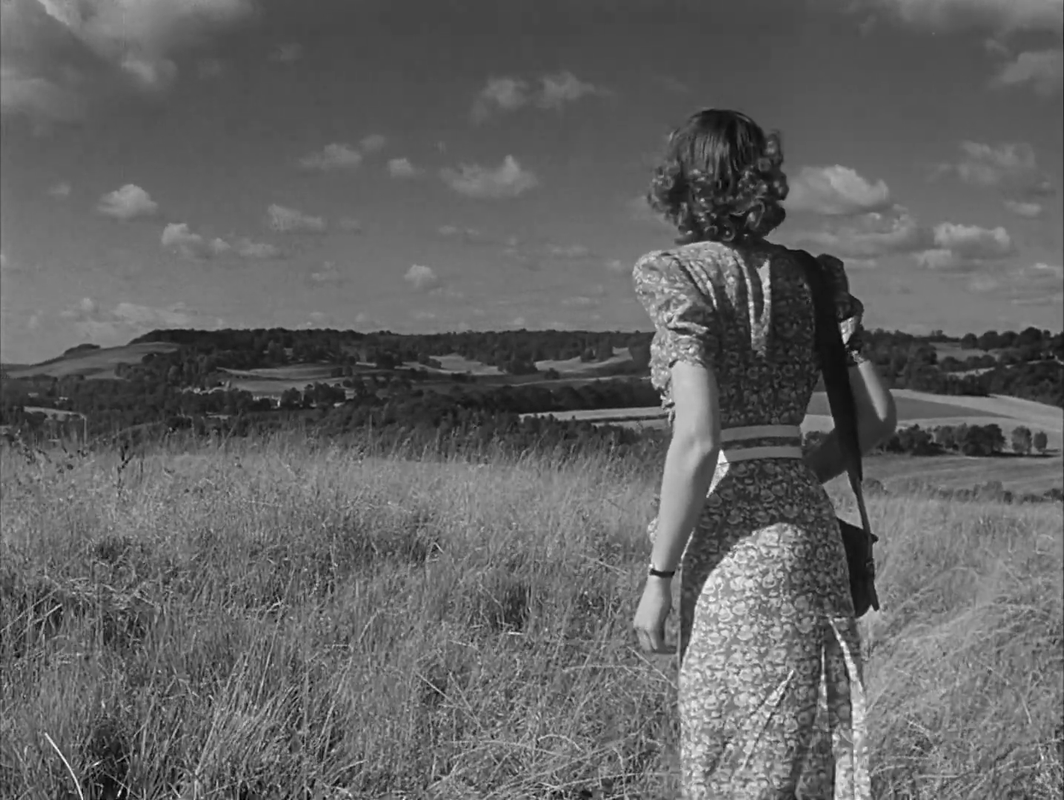
Alison (Sheila Sim) looking out over the rolling hills of Kent with the Canterbury Cathedral somewhere out there. DP: Erwin Hillier.
– Thomas Colpeper, JP
“Pray for me. I forgive the evil done me.”
Procès de Jeanne d'Arc [The Trial of Joan of Arc] (Robert Bresson, 1962)
Aug
17
forgiveness
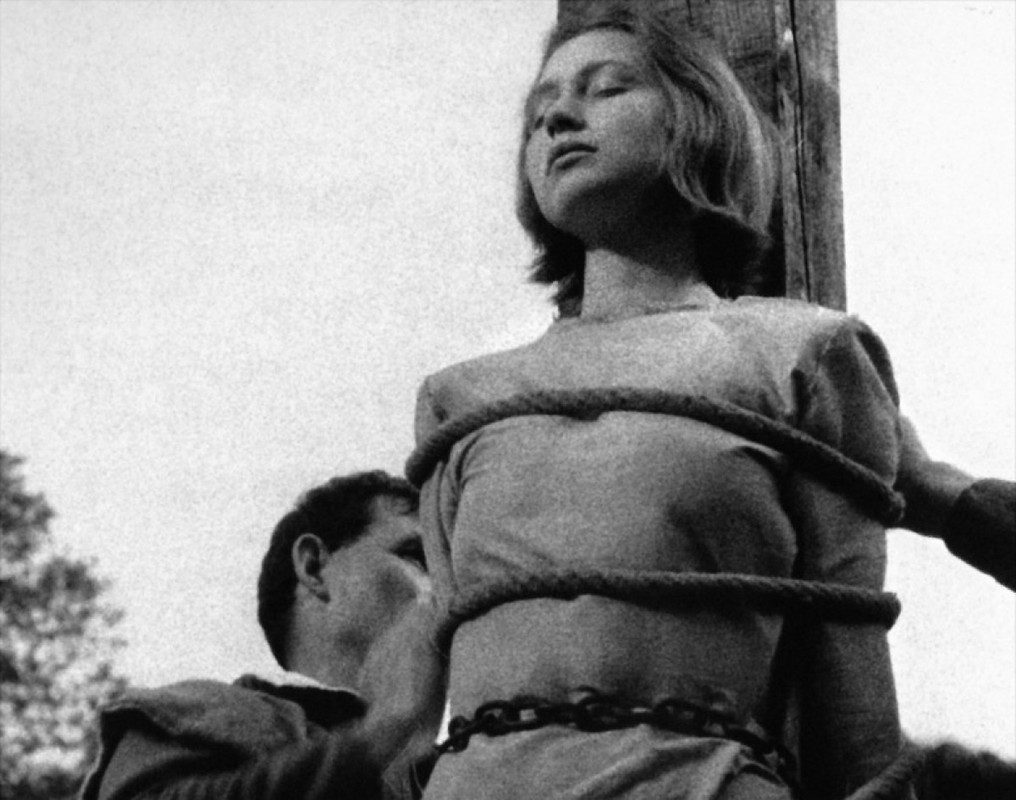
Jeanne (Florence Delay) bound to the stake. DP: Léonce-Henri Burel.
Holi: someone is forgiven (forgiveness being an important aspect of Holi)*
– Jeanne d'Arc
Jeanne trusts her delusions to forgive the people who brought her to justice.
* the Bales 2025 Film Challenge for August is not date-related but lists, for the most part, the colours of the rainbow.
Fuoco! [Fire!] (Gian Vittorio Baldi, 1968)
Aug
15
Ferragosto
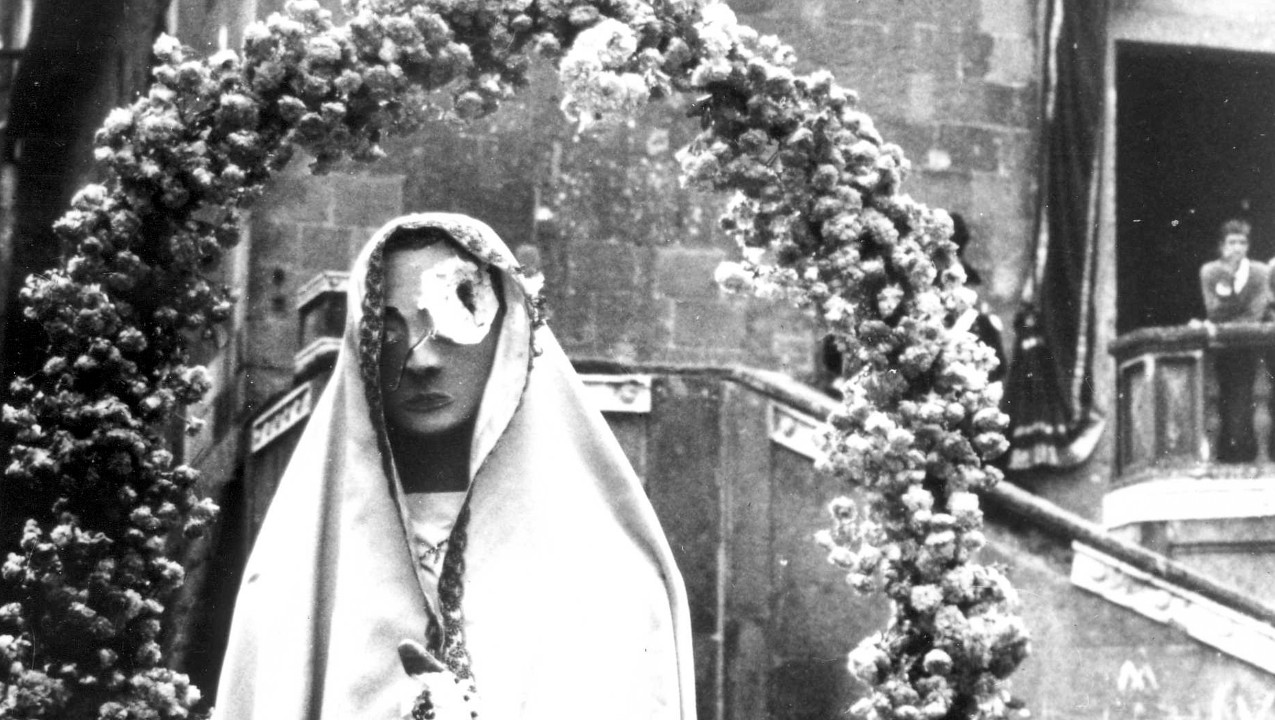
The statue of the Virgin with a bullet hole right through her eye. DP: Ugo Piccone.
Someone opens fire on August 15, the day of Ferragosto and the Virgin's Assumption
“Tell me the truth!” Ovoce stromů rajských jíme [We Eat the Fruit of the Trees of Paradise] (Věra Chytilová, 1970)
Aug
6
orange
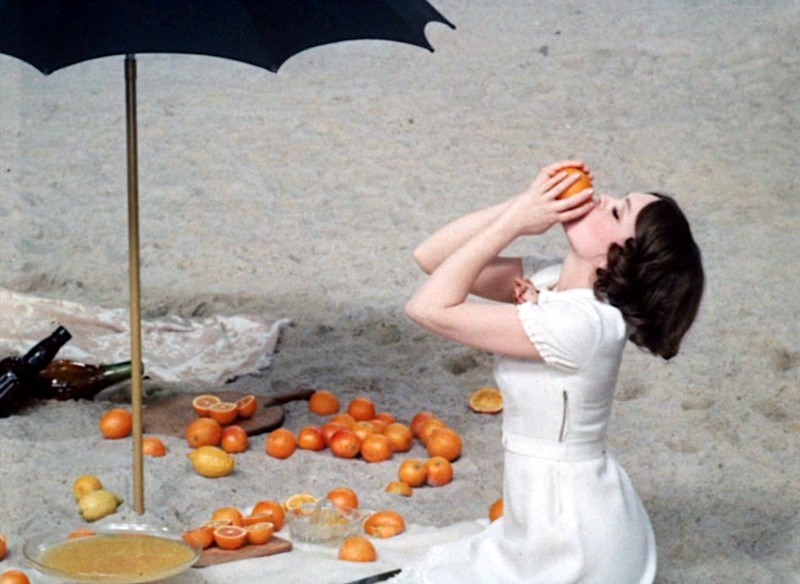
Eva (Jitka Novákova) devouring oranges under a black umbrella (via). DP: Jaroslav Kučera.
Orange, food or fashion*
– choir
An allegorical, psychedelic retelling of Genesis 3 and the Fall of Man
* the Bales 2025 Film Challenge for August is not date-related but lists, for the most part, the colours of the rainbow.
“I don’t have the inhibitions that a practicing Catholic would in that I’m not paralysed by the sacredness of the text, nor do I have the inhibitions of a lapsed Catholic who would view approaching the story of Jesus as compromising his Marxist beliefs, of sinking back into conformity.” Il vangelo secondo Matteo [The Gospel According to Matthew] (Pier Paolo Pasolini, 1964)
Jun
22
National Kissing Day
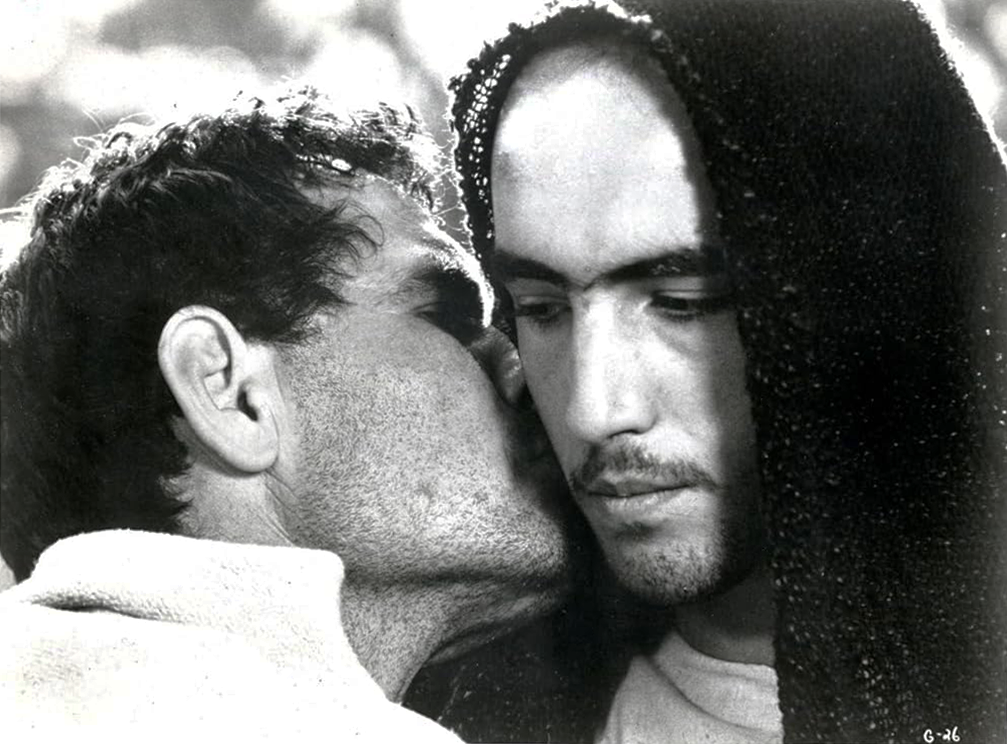
Judas (Otello Sestili) kisses Jesus (Enrique Irazoqui) in intimate closeup. DP: Tonino Delli Colli.
A [favourite] movie kiss for National Kissing Day (USA*), not to be confused with International Kissing Day aka World Kiss Day which falls on July 6.
– PPP, via
An neorealist, straightforward adaptation of the Gospel of Matthew, populated by non-actors (“Jesus” is a 19-year Catalan trade unionist picked for his resemblance to El Greco's Christ), intellectuals, and anachronistic characters based on biblical art through the ages.
According to said Gospel, apostle Judas kissed prophet Jesus to signal to the police who of the 13 men present was the one to arrest.
Interestingly, the word Matthew chose to describe the kiss is καταφιλέω, the same word used by philosopher Plutarch to describe the kiss between Alexander the Great and his eunuch Bagoas
* no one wants to kiss you anymore, America